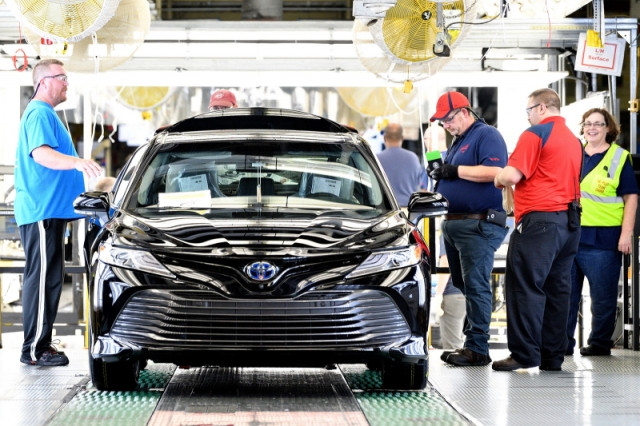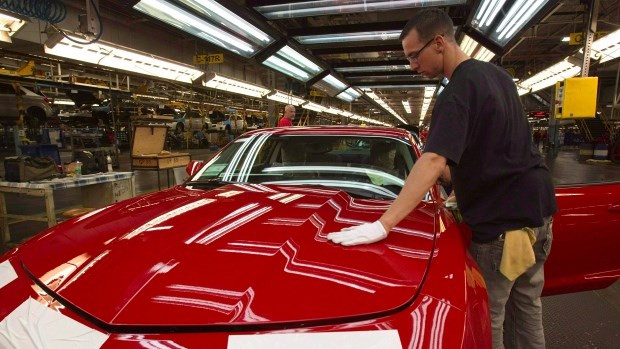Cars and a series of cheap goods from CPTPP countries will flood into Vietnam?
Car imports from ASEAN countries have dropped to 0%, but car prices and a series of other products are expected to continue to drop dramatically when the Comprehensive and Progressive Agreement for Trans-Pacific Partnership (CPTPP) was officially signed.

Cars and a series of cheap goods from CPTPP countries will flood into Vietnam?
Luxury cars will become cheaper and cheaper
Mr. Luong Hoang Thai - Director of the Multilateral Trade Policy Department (Ministry of Industry and Trade) said that CPTPP member countries committed to reducing most of the items for Vietnam to 0% when exporting. One of the items that many Vietnamese consumers are interested in is cars, because the dream of many Vietnamese families is still to own a "car" to serve their daily travel needs. However, according to many experts, although car prices in Vietnam have decreased sharply in 2017, they are still 3-5 times more expensive than car prices in developed countries.
In early 2018, when the import tax rate for complete cars from ASEAN was 0%, consumers expected to own cheap cars. However, up to now, only the first shipment of about 2,000 Honda cars has arrived at the port with the selling price expected to decrease from 200 - 240 million VND/car depending on the version.
Although the price of imported cars from ASEAN countries has decreased sharply, many people still expect the price of cars to decrease further, gradually moving towards the real value of the manufacturer, especially cars from countries such as Japan, Canada... whose tax rate will be 0% after Vietnam becomes a member of CPTPP. "Most of the products of CPTPP member countries will be committed by Vietnam to open the tariff barrier after 7-10 years, especially for cars, after 7 years the tax rate will be 0%", Mr. Thai said.
However, along with the "big guy" Vingroup, the Vietnamese people's dream of owning a car is realized in the context of the import tax on cars from ASEAN countries being 0%. In the long term, when Vietnam participates in deep integration, the tax from CPTPP countries and many other countries will also be 0%. Many consumers are worried that when they buy a car, there may be no more parking space in Vietnam.
According to the General Department of Customs, in 2017, Vietnam imported 3,284 completely built-up cars from Japan and 52 from Canada. Since the beginning of 2018, the number of completely built-up cars in general from all markets has decreased sharply after Decree 116 was issued. Besides Japan and Canada, most of the remaining countries in the CPTPP bloc do not have outstanding strengths in car production.

After 7 years, "luxury" cars will become cheaper and cheaper in Vietnam (Photo: IT)
What tax incentives does Vietnam get?
The Department of Multilateral Trade Policy (Ministry of Industry and Trade) stated that one of the fundamental factors that brings benefits to these economic sectors from the CPTPP Agreement is the commitments to reduce import taxes of CPTPP countries.
Accordingly, Australia committed to cutting 93% of tariff lines, equivalent to 95.8% of Vietnam's export turnover to this market (about 2.9 billion USD) immediately upon implementing the CPTPP Agreement. The remaining products will have their tariffs eliminated with the final maximum reduction schedule in the 4th year;
Brunei also committed to eliminating 92% of tariff lines on imported goods from Vietnam (equivalent to 7,639 lines) as soon as the CPTPP Agreement comes into effect, eliminating up to 99.9% in the 7th year and completely eliminating import taxes in the 11th year.
Canada commits to immediately eliminate 94.9% of tariff lines, equivalent to 77.9% of import turnover from Vietnam (about 0.88 billion USD) as soon as the Agreement comes into effect, and the total number of tariff lines eliminated is up to 96.3% of tariff lines, equivalent to 93.4% of import turnover from Vietnam. Vietnam's agricultural, electrical and electronic products will have most of their tariffs eliminated right from the time the commitment begins to be implemented. Furniture and rubber products will be completely eliminated as soon as the Agreement comes into effect or in the 5th year.
Chile committed to eliminating 95.1% of tariff lines as soon as the Agreement comes into effect, equivalent to 60.2% of Vietnam's export turnover to Chile (about 76 million USD). In the 8th year, Chile will eliminate 99.9% of tariff lines, equivalent to 100% of import turnover from Vietnam. Vietnam's agricultural and aquatic products with export strengths will have their tariffs eliminated as soon as the Agreement comes into effect.
Japan commits to eliminating 86% of tariff lines, equivalent to 93.6% of Vietnam's export turnover to Japan (about 10.5 billion USD) as soon as the Agreement comes into effect and eliminating about 95.6% of tariff lines in the 11th year. Thus, compared to the commitment in the Vietnam - Japan FTA, many priority products of Vietnam have a significantly shortened roadmap. Most of Vietnam's strong seafood products enjoy a 0% tax rate immediately after the Agreement comes into effect, such as yellowfin tuna, striped tuna, swordfish, some species of cod, surimi, shrimp, crab, etc. All seafood products that are not committed to eliminating taxes in the Vietnam - Japan FTA will be eliminated in the CPTPP with the elimination roadmap in the 6th, 11th or 16th year from the date the Agreement comes into effect.
Malaysia commits to eliminate 84.7% of tariff lines as soon as the Agreement comes into effect and gradually eliminate the remaining tariff lines. In the 11th year, the number of tariff lines Malaysia commits to reduce will reach 99.9%. Mexico commits to eliminate 77.2% of tariff lines, accounting for 36.5% of Vietnam's export turnover to Mexico, equivalent to 282 million USD, as soon as the Agreement comes into effect, and will eliminate 98% of tariff lines in the 10th year.
Important export items such as tra and basa fish will have their taxes eliminated in the third year from the date the Agreement comes into effect; frozen shrimp will be eliminated in the 13th year; processed shrimp will be eliminated in the 12th year; processed tuna will be eliminated in the 16th year, with the base tax rate remaining the same for the first five years and then gradually decreasing to 0%.
Agricultural products such as paddy, brown rice and broken rice will have their taxes eliminated immediately upon the Agreement coming into effect; milled rice products will be reduced to 0% in the 10th year; Robusta coffee beans will have their taxes eliminated in the 16th year; Arabica coffee beans and processed coffee will have their tax rates reduced by 50% compared to the current tax rate in the 5th and 10th years from the Agreement coming into effect.
New Zealand committed to eliminating 94.6% of tariff lines as soon as the Agreement comes into effect, equivalent to 69% of Vietnam's export turnover to this market (about 101 million USD). In the 7th year since the Agreement's implementation, the remaining tariff lines will be gradually eliminated completely.
Peru committed to eliminating 80.7% of tariff lines as soon as the Agreement comes into effect, equivalent to 62.1% of import turnover from Vietnam (about 15.6 million USD) and will eliminate tariffs on 99.4% of total tariff lines by the 17th year.
Vietnam's agricultural products with export strengths such as cashew nuts, tea, pepper, vegetables, and some types of coffee will all have their taxes eliminated as soon as the Agreement comes into effect.
Singapore alone committed to completely eliminating tariffs on all Vietnamese goods as soon as the CPTPP Agreement is implemented.
